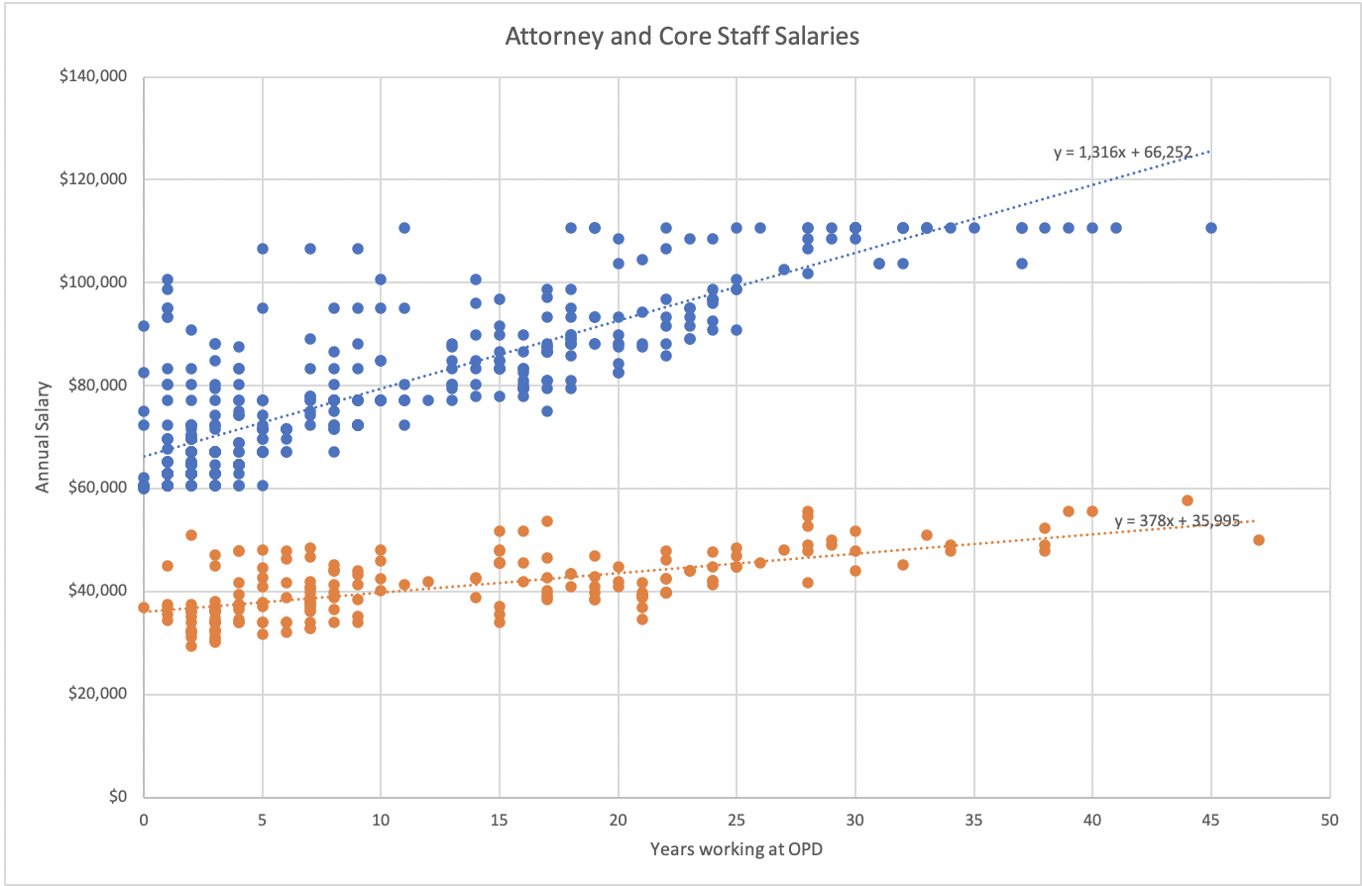- New core staffers are paid less than a living wage
- New attorneys are underpaid compared to their student loan debt and their peers in the private sector
- For each year spent working at OPD, the average core staffer’s salary increases just $378 and the average attorney’s salary just $1,316
An analysis of public salary data confirms what every OPD worker already suspects: we aren’t paid enough or given enough opportunities for advancement. The MDU formed to fight for all OPD workers and making sure we’re paid what we deserve is a key part of that fight. But we can’t make progress on this issue until we have the right to collectively bargain, and the first step in that process is having a majority of OPD workers join us in the MDU. If you want to change the unacceptable underpayment of OPD workers, join your union today.
***
There are 411 full-time attorneys at OPD with the official job title Assistant Public Defender I, II, or III. These are the line attorneys who make up the bulk of the lawyers at the agency. And there are 194 full-time core staffers whose official job title is Admin Aide, Admin Specialist, Office Clerk, Office Secretary, Paralegal, Personnel Associate, or Intake Specialist. These are the core staffers who talk with our clients every day and keep every office running smoothly.
Because OPD is a state agency, all of our salaries are public information. That means we can look up how long each of the workers in those categories has been working at OPD and how much they get paid. Here’s what that looks like in a chart, with attorneys in blue and core staff in orange.

There’s a lot of info we can pull from this chart.
- Core staffers aren’t paid a living wage. MIT researchers estimate that the adults in a family of four living in Baltimore, made up of two working adults and two children, have to earn $37,565 per year to support themselves. The median salary for a core staffer with between zero and five years of service at OPD is only $36,099. If that family has just one working adult, that person needs to make $59,862 to support themselves and their children. None of the core staffers in this group are making that much, not even the ones who have decades of service working for OPD.
- Line attorneys are underpaid. The median salary for a line attorney with between zero and five years of service at OPD is just $67,044, which isn’t much compared to the $145,000 in debt that the average lawyer has after graduating law school or the $155,000 median annual salary for lawyers in the private sector.
- Commitment is not rewarded. On average, for each year a line attorney has been working at OPD, their salary is $1,316 higher than an attorney just starting at OPD. That’s about two percent of that $67,044 median figure, barely enough to keep up with inflation each year. But it’s even worse for core staffers. On average, for each year a core staffer has been working at OPD, their salary is just $378 higher than a newly hired core staffer. That’s barely one percent of the median starting salary. In other words, after adjusting for inflation each year, line attorney income barely increases and core staffer income decreases.
This data confirms what every OPD worker probably suspected: we are underpaid, and we aren’t given enough opportunities for advancement. Of course, no one works at a public defender agency because they think it’s a way to get rich; we work for OPD because we care about fighting for our clients and doing what’s right. That doesn’t mean it’s okay for the state to pay us less than we deserve or, for core staff, less than what we need to live.
At this point in time, there’s not much the MDU can do directly to address this issue. But all that will change once we have the right to collectively bargain – on average, collective bargaining raises worker wages by 20 percent! To get to that point, we need to push for and pass a law in the Maryland legislature, and to do that, we need a majority of OPD workers to join the union. In other words, we need you! Join the union, get involved with the Organizing Committee, and tell your friends and your coworkers about what we’re doing. Improving our working conditions isn’t going to be an easy fight, but if we fight together, it’s one we will win.
